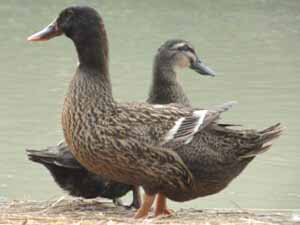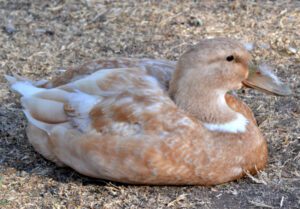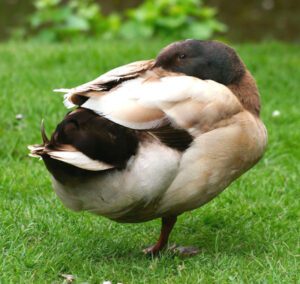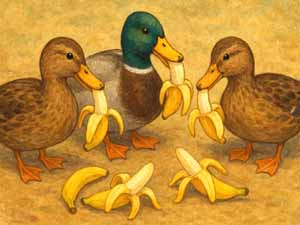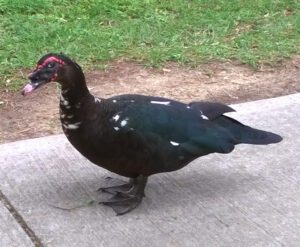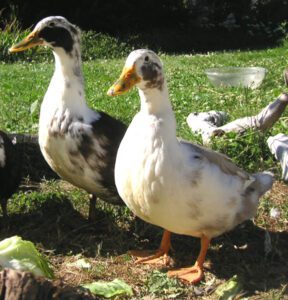The Orpington duck is a breed of domestic duck originating in the United Kingdom. It is also known as the Buff Orpington duck. It is a beautiful dual purpose breed of duck used for both meat and egg production.
The Orpington duck was originally crated by the famous poultry breeder ‘William Cook’ of Orpington, Kent, United Kingdom. William Cook was also the developer of the Orpington chicken, which is also a popular dual purpose chicken breed and a number of Orpington duck varieties including the Blue, Buff and Black.
There was also the White variety, but they never gained popularity. The Orpington duck was created from the selection of mis-marked Blue Orpington ducks.
The Buff variety came about by blending Aylesbury, Cayuga, Runner and Rouen ducks for creating the buff color that would allow him to cash in on the early 20th century English fad for buff-colored plumage.
The Orpington duck was first introduced to the public in October 1897 at the Dairy show, the Agricultural Hall (q.v.), Islington, London. And was introduced to the United States in 1908 at the Madison Square Garden Show in New York City.
The Orpington duck was admitted to the British Poultry Standard in 1910. And was admitted into the American Poultry Association’s Standard of Perfection in the Medium class as the Buff Duck in 1914. The breed is available in three color varieties; Brown, Buff and Blond. Buff variety is common and other color varieties are extremely rare.
Today the Orpington duck is considered a threatened duck breed by the American Livestock Breeds Conservancy.
Orpington Duck Characteristics
The Orpington duck is classed as a medium sized duck. It is a very beautiful dual purpose duck breed. Orpington ducks have a long, broad and deep body with carriage about 20 degrees above the horizontal. They have oval head, medium length bill and long gracefully curved neck. They have a small, well-curled tail and their wings are short.
Both Orpington duck and drakes have brown eyes, orange-yellow shanks and feet, and buff plumage. But there are color differences in their bill. The duck’s bill is brown-orange, but the drake’s bill is yellow. The buff has a reddish undertone, but ideally the color is even all over without grey, white or penciled feathers, and not with white neck ring.
The drakes have a glossy brown head and upper neck, this color should finish in a sharp line all around the neck. And there should be no trace of green and a minimum of blue on the rump.
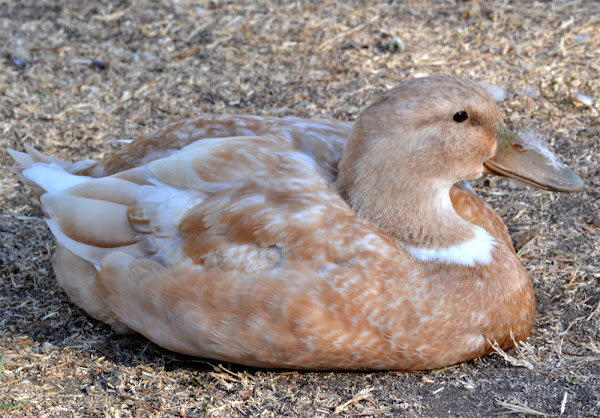
The plumage of the Orpington duck can fade in sunlight, as with other buff-colored poultry breeds. The breed is medium in size, and their average body weight is between 2.2 and 3.4 kg. Photo from Wikipedia.
Uses
Orpington ducks were developed mainly as an utility bird. They are suitable for both meat and eggs production. The breed is also an attractive and popular exhibition bird.
Special Notes
The Orpington duck is an attractive dual purpose bird. It is a good egg laying duck breed and also very suitable for meat production. Ducks usually are capable of laying up to 220 eggs a year.
They are relatively fast growing duck breed and become ready for the market within 8-10 weeks. Many people consider the Orpington duck as a good meat duck breed. They dress out well because their light pin feathers do not show on the plucked carcass.
This is an ideal breed for the garden or backyard. They are active, less flighty, hardy and usually docile. They are great foragers and also suitable for free range duck farming.
Ducks lay larger sized white or tinted colored eggs. And they tend to go broody and are fair mothers. However, review full breed profile of this duck breed in the chart below.
| Breed Name | Orpington |
| Other Name | Buff Orpington |
| Breed Purpose | Dual Purpose |
| Special Notes | Active, Calm, Docile, Excellent Foragers |
| Breed Class | Medium |
| Broodiness | Average |
| Drake | 2.2 to 3.4 kg |
| Duck | 2.2 to 3.2kg |
| Climate Tolerance | All Climates |
| Egg Color | White or Tinted |
| Egg Size | Large |
| Egg Weight | 80-90 grams |
| Egg Productivity | Medium |
| Flying Ability | Less Flighty |
| Rarity | Common |
| Varieties | Buff, Blond, Brown |
| Country of Origin | United Kingdom |
